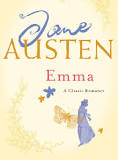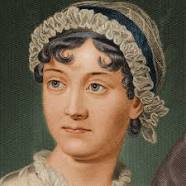Emma Page #17
Emma, by Jane Austen, is a novel about youthful hubris and the perils of misconstrued romance. The story takes place in the fictional village of Highbury and the surrounding estates of Hartfield, Randalls, and Donwell Abbey and involves the relationships among individuals in those locations consisting of "3 or 4 families in a country village". The novel was first published in December 1815 while the author was alive, with its title page listing a publication date of 1816. As in her other novels, Austen explores the concerns and difficulties of genteel women living in Georgian–Regency England; she also creates a lively comedy of manners among her characters and depicts issues of marriage, gender, age, and social status.
“We think so very differently on this point, Mr. Knightley, that there can be no use in canvassing it. We shall only be making each other more angry. But as to my letting her marry Robert Martin, it is impossible; she has refused him, and so decidedly, I think, as must prevent any second application. She must abide by the evil of having refused him, whatever it may be; and as to the refusal itself, I will not pretend to say that I might not influence her a little; but I assure you there was very little for me or for any body to do. His appearance is so much against him, and his manner so bad, that if she ever were disposed to favour him, she is not now. I can imagine, that before she had seen any body superior, she might tolerate him. He was the brother of her friends, and he took pains to please her; and altogether, having seen nobody better (that must have been his great assistant) she might not, while she was at Abbey-Mill, find him disagreeable. But the case is altered now. She knows now what gentlemen are; and nothing but a gentleman in education and manner has any chance with Harriet.” “Nonsense, errant nonsense, as ever was talked!” cried Mr. Knightley.--“Robert Martin's manners have sense, sincerity, and good-humour to recommend them; and his mind has more true gentility than Harriet Smith could understand.” Emma made no answer, and tried to look cheerfully unconcerned, but was really feeling uncomfortable and wanting him very much to be gone. She did not repent what she had done; she still thought herself a better judge of such a point of female right and refinement than he could be; but yet she had a sort of habitual respect for his judgment in general, which made her dislike having it so loudly against her; and to have him sitting just opposite to her in angry state, was very disagreeable. Some minutes passed in this unpleasant silence, with only one attempt on Emma's side to talk of the weather, but he made no answer. He was thinking. The result of his thoughts appeared at last in these words. “Robert Martin has no great loss--if he can but think so; and I hope it will not be long before he does. Your views for Harriet are best known to yourself; but as you make no secret of your love of match-making, it is fair to suppose that views, and plans, and projects you have;--and as a friend I shall just hint to you that if Elton is the man, I think it will be all labour in vain.” Emma laughed and disclaimed. He continued, “Depend upon it, Elton will not do. Elton is a very good sort of man, and a very respectable vicar of Highbury, but not at all likely to make an imprudent match. He knows the value of a good income as well as any body. Elton may talk sentimentally, but he will act rationally. He is as well acquainted with his own claims, as you can be with Harriet's. He knows that he is a very handsome young man, and a great favourite wherever he goes; and from his general way of talking in unreserved moments, when there are only men present, I am convinced that he does not mean to throw himself away. I have heard him speak with great animation of a large family of young ladies that his sisters are intimate with, who have all twenty thousand pounds apiece.” “I am very much obliged to you,” said Emma, laughing again. “If I had set my heart on Mr. Elton's marrying Harriet, it would have been very kind to open my eyes; but at present I only want to keep Harriet to myself. I have done with match-making indeed. I could never hope to equal my own doings at Randalls. I shall leave off while I am well.” “Good morning to you,”--said he, rising and walking off abruptly. He was very much vexed. He felt the disappointment of the young man, and was mortified to have been the means of promoting it, by the sanction he had given; and the part which he was persuaded Emma had taken in the affair, was provoking him exceedingly. Emma remained in a state of vexation too; but there was more indistinctness in the causes of her's, than in his. She did not always feel so absolutely satisfied with herself, so entirely convinced that her opinions were right and her adversary's wrong, as Mr. Knightley. He walked off in more complete self-approbation than he left for her. She was not so materially cast down, however, but that a little time and the return of Harriet were very adequate restoratives. Harriet's staying away so long was beginning to make her uneasy. The possibility of the young man's coming to Mrs. Goddard's that morning, and meeting with Harriet and pleading his own cause, gave alarming ideas. The dread of such a failure after all became the prominent uneasiness; and when Harriet appeared, and in very good spirits, and without having any such reason to give for her long absence, she felt a satisfaction which settled her with her own mind, and convinced her, that let Mr. Knightley think or say what he would, she had done nothing which woman's friendship and woman's feelings would not justify. He had frightened her a little about Mr. Elton; but when she considered that Mr. Knightley could not have observed him as she had done, neither with the interest, nor (she must be allowed to tell herself, in spite of Mr. Knightley's pretensions) with the skill of such an observer on such a question as herself, that he had spoken it hastily and in anger, she was able to believe, that he had rather said what he wished resentfully to be true, than what he knew any thing about. He certainly might have heard Mr. Elton speak with more unreserve than she had ever done, and Mr. Elton might not be of an imprudent, inconsiderate disposition as to money matters; he might naturally be rather attentive than otherwise to them; but then, Mr. Knightley did not make due allowance for the influence of a strong passion at war with all interested motives. Mr. Knightley saw no such passion, and of course thought nothing of its effects; but she saw too much of it to feel a doubt of its overcoming any hesitations that a reasonable prudence might originally suggest; and more than a reasonable, becoming degree of prudence, she was very sure did not belong to Mr. Elton. Harriet's cheerful look and manner established hers: she came back, not to think of Mr. Martin, but to talk of Mr. Elton. Miss Nash had been telling her something, which she repeated immediately with great delight. Mr. Perry had been to Mrs. Goddard's to attend a sick child, and Miss Nash had seen him, and he had told Miss Nash, that as he was coming back yesterday from Clayton Park, he had met Mr. Elton, and found to his great surprize, that Mr. Elton was actually on his road to London, and not meaning to return till the morrow, though it was the whist-club night, which he had been never known to miss before; and Mr. Perry had remonstrated with him about it, and told him how shabby it was in him, their best player, to absent himself, and tried very much to persuade him to put off his journey only one day; but it would not do; Mr. Elton had been determined to go on, and had said in a very particular way indeed, that he was going on business which he would not put off for any inducement in the world; and something about a very enviable commission, and being the bearer of something exceedingly precious. Mr. Perry could not quite understand him, but he was very sure there must be a lady in the case, and he told him so; and Mr. Elton only looked very conscious and smiling, and rode off in great spirits. Miss Nash had told her all this, and had talked a great deal more about Mr. Elton; and said, looking so very significantly at her, “that she did not pretend to understand what his business might be, but she only knew that any woman whom Mr. Elton could prefer, she should think the luckiest woman in the world; for, beyond a doubt, Mr. Elton had not his equal for beauty or agreeableness.”
Translation
Translate and read this book in other languages:
Select another language:
- - Select -
- 简体中文 (Chinese - Simplified)
- 繁體中文 (Chinese - Traditional)
- Español (Spanish)
- Esperanto (Esperanto)
- 日本語 (Japanese)
- Português (Portuguese)
- Deutsch (German)
- العربية (Arabic)
- Français (French)
- Русский (Russian)
- ಕನ್ನಡ (Kannada)
- 한국어 (Korean)
- עברית (Hebrew)
- Gaeilge (Irish)
- Українська (Ukrainian)
- اردو (Urdu)
- Magyar (Hungarian)
- मानक हिन्दी (Hindi)
- Indonesia (Indonesian)
- Italiano (Italian)
- தமிழ் (Tamil)
- Türkçe (Turkish)
- తెలుగు (Telugu)
- ภาษาไทย (Thai)
- Tiếng Việt (Vietnamese)
- Čeština (Czech)
- Polski (Polish)
- Bahasa Indonesia (Indonesian)
- Românește (Romanian)
- Nederlands (Dutch)
- Ελληνικά (Greek)
- Latinum (Latin)
- Svenska (Swedish)
- Dansk (Danish)
- Suomi (Finnish)
- فارسی (Persian)
- ייִדיש (Yiddish)
- հայերեն (Armenian)
- Norsk (Norwegian)
- English (English)
Citation
Use the citation below to add this book to your bibliography:
Style:MLAChicagoAPA
"Emma Books." Literature.com. STANDS4 LLC, 2024. Web. 26 Dec. 2024. <https://www.literature.com/book/emma_29>.




Discuss this Emma book with the community:
Report Comment
We're doing our best to make sure our content is useful, accurate and safe.
If by any chance you spot an inappropriate comment while navigating through our website please use this form to let us know, and we'll take care of it shortly.
Attachment
You need to be logged in to favorite.
Log In